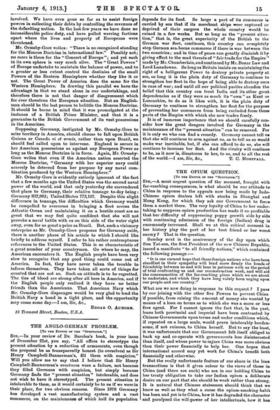THE MONROE DOCTRINE.
[TO THE EDITOR OF THE "SPECTATOR...I SIE,—In your issue of November 16th a letter appears over the signature of Seymour Ormsby-Gore entitled "Compensa- tion for Germany." In this communication Mr. Ormsby-Gore calls attention to the fact that the grievance of Germany against England is that England has obstructed her colonial expansion and that the way out of it is for Germany to take Brazil. Should anyone interpose the "Monroe Doctrine," Mr. Ormsby-Gore's answer is, "The Monroe Doctrine in modern times is the biggest possible piece of bluff '; . . . there- fore it is reasonable to suppose that. . . it would not be asserted by the American nation." Were any person in the United States to propose such a solution to Germany's desire for colonial expansion as that of Mr. Ormsby-Gore, it would be taken for granted that be was jesting, and it is only because it appears in the Spectator that I feel bound to assume that it is to be taken seriously.
Let me assure your readers, then, that the Monroe Doctrine was never more a vital part of the American policy than at present. Nay more, it has expanded in no inconsiderable degree since President Monroe, in 1823, promulgated the principle that "the American continents are henceforth not to be considered as subjects for future colonization by any European power, and that we could not view any interposition for the purpose of oppressing or controlling in any manner the destiny of any American Government whose independence we acknowledge as other than manifestation of an unfriendly disposition towards the United States." To-day we not only guarantee the integrity of territory, but we view with grave concern any attempt on the part of a European power to col- lect its bad debts from some recalcitrant South American republic by force, so apprehensive are we lest in such under- taking the principle of our doctrine be violated and we become involved. We have even gone so far as to assist foreign powers in collecting their debts by controlling the revenues of the defaulting nation. In the last few years we have done no inconsiderable police duty, and have pulled warring factions apart where the lives and property of Europeans were threatened.
" Mr. Ormsby-Gore writes : "There is no recognized standing for the Monroe Doctrine in international law." Possibly not; no more is there for the "Concert of Europe"; and yet each in its own sphere is very much alive. The "Great Powers" of Europe undertake to maintain the balance of power, and to a greater or less extent control the destinies of the small Powers of. the Eastern Hemisphere whether they like it or not. The Great. Power of America does the same for the Western Hemisphere. In drawing this parallel we have the advantage in that we stand alone in our undertakings, and therefore there is not that danger of disagreement which for ever threatens the European situation. But an English- man should be the last person to belittle the Monroe Doctrine. It should be borne in mind that it was promulgated at the instance of a British Prime Minister, and that it is a guarantee to the British Government of its vast possessions in the Americas.
Supposing Germany, instigated by Mr. Ormsby-Gore to seize territory in America, should choose to fall upon British Guiana or Canada vi et armis, rather than upon Brazil, we should feel called upon to intervene. England is secure in her American possessions as against any European Power as long as the Monroe Doctrine is in force. Again, Mr. Ormsby- Gore writes that even if the American nation asserted the Monroe Doctrine, "Germany with her superior navy could scarcely be deterred from her purpose by any naval com- bination produced by the Western Hemisphere."
Mr. Ormsby-Gore is evidently entirely ignorant of the fact that a few months ago the United States was the second naval power of the world, and that only yesterday she surrendered that place to Germany, their relative tonnage to-day being : Germany 837,982; United States 773,107. Despite this slight difference in tonnage, the difficulties which Germany would be compelled to overcome in bringing a fleet across the Atlantic Ocean and maintaining it on a hostile coast are so great that we may feel quite confident that she will not provoke a naval battle with us on this side of the water right away, even for so great a prize as Brazil. But, such a visionary enterprise as Mr. Ormsby-Gore proposes for Germany aside, there is another phase of his article to which I should like briefly to address myself. I refer to his rather contemptuous references to the United States. This is so characteristic of a great number of your countrymen. Go where he may, the American encounters it. The English people have been very slow to recognize that any good thing could come out of America. In fact, they have never taken the trouble to inform themselves. They have taken all sorts of things for granted that are not so. Such an attitude is to be regretted. The ties of blood are strong after all here in America, and if tile English people only realized it they have no better friends than the Americans. That American Navy which Mr. Ormsby-Gore disparages would be very glad to lend the British Navy a hand in a tight place, and the opportunity may come some day.—I am, Sir, Sze.,
EDGAR 0. ACHORN.
18 Tremont Street, Boston, U.S.A.























































 Previous page
Previous page